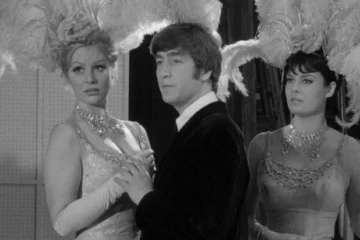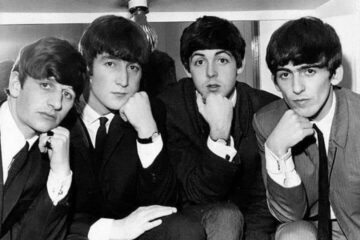The Beatles’ status as a boyband is arguable among rock fans, but it is undeniable that the Fab Four served as a blueprint for classic boyband personality tropes. John Lennon as the “bad boy”, Paul McCartney as the “cute one”, George Harrison as the “quiet one” and Ringo Starr as the “funny one”. As if by natural symbiosis, Lennon and McCartney’s images worked in tandem. Lennon had the quick wit, while McCartney had the endearing charm. Combined with their existing brotherly bond, it was inevitable that the pair would fall into place as co-leaders of the band, eventually developing a songwriting partnership that would be regarded as one of the most important collaborations in pop music history.
While the two flourished in their roles, one Beatle’s label would hinder his recognition as a songwriter within the band. Although Harrison maintained a reserved, introspective demeanour, he brought an adventurous spirit through his guitar playing. He incorporated a diverse range of influences from rockabilly to jazz, eventually introducing non-Western musical elements that would later mark an important shift in the creative direction of The Beatles.
Harrison displayed exemplary guitar prowess. His next step was to broaden his musicianship through songwriting. Although the Lennon-McCartney partnership took precedence, Harrison knew what he was capable of. He began to write more and advocate for his work, making efforts to assert himself. Unfortunately, a firm songwriting monopoly was in place. By the time the band started arranging songs for their pinnacle self-titled record in 1968, also known as the White Album, the dynamic duo still weren’t wholly convinced by Harrison’s ability.
The White Album came to be a vast work which allowed each band member to display their individual personalities as musicians. Of the 30 songs on the album, Harrison contributed four. Surprisingly, it was one of the record’s most celebrated tracks that Lennon and McCartney were unmoved by: ‘While My Guitar Gently Weeps’. Like much of Harrison’s work at the time, the idea for the song was inspired by Eastern philosophy. He looked to the Chinese I Ching, extracting the concept that everything that occurs is what is meant to be, and each aspect of his songwriting carries purpose.
For a moment, ‘While My Guitar Gently Weeps’ almost wasn’t meant to be. “We tried to record it, but John and Paul were so used to just cranking out their tunes that it was very difficult at times to get serious and record one of mine. It wasn’t happening. They weren’t taking it seriously and I don’t think they were even all playing on it, and so I went home that night thinking, ‘Well, that’s a shame’, because I knew the song was pretty good”, Harrison explained in Anthology.
Rather than giving up, Harrison called for reinforcements. Having developed a close friendship with respected guitarist Eric Clapton, Harrison sought out his support. He continued his recollection in Anthology. “The next day, I was driving into London with Eric Clapton, and I said, ‘What are you doing today? Why don’t you come to the studio and play on this song for me?’ He said, ‘Oh, no – I can’t do that. Nobody’s ever played on a Beatles record, and the others wouldn’t like it.’ I said, ‘Look, it’s my song, and I’d like you to play on it.’ So he came in. I said, ‘Eric’s going to play on this one,’ and it was good because that then made everyone act better. Paul got on the piano and played a nice intro, and they all took it more seriously.”
Ultimately, Clapton’s presence upped the enthusiasm for the track in the studio. His now-famous, passionately pained guitar solo was just enough to keep the band interested. It was evident that Harrison grew confident in his songwriting but often felt stifled and struggled to gain recognition from Lennon and McCartney – a gripe that created an open wound of tension and frustration. However, ‘While My Guitar Gently Weeps’ marked a turning point for Harrison. Not only did he prove his creative strength to the band, he also established his artistry within the wider world of rock music. As it turns out, he wasn’t so quiet after all.




